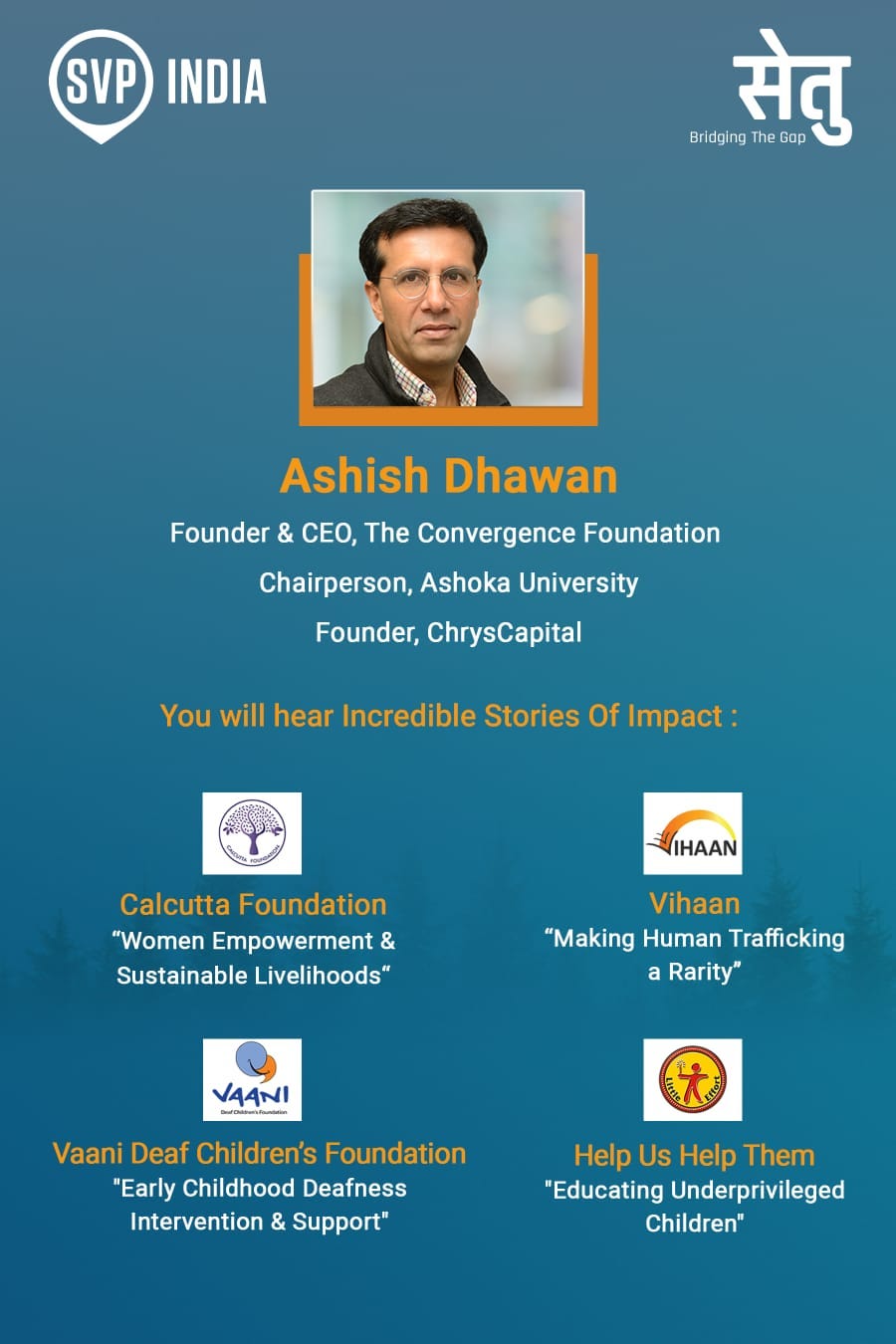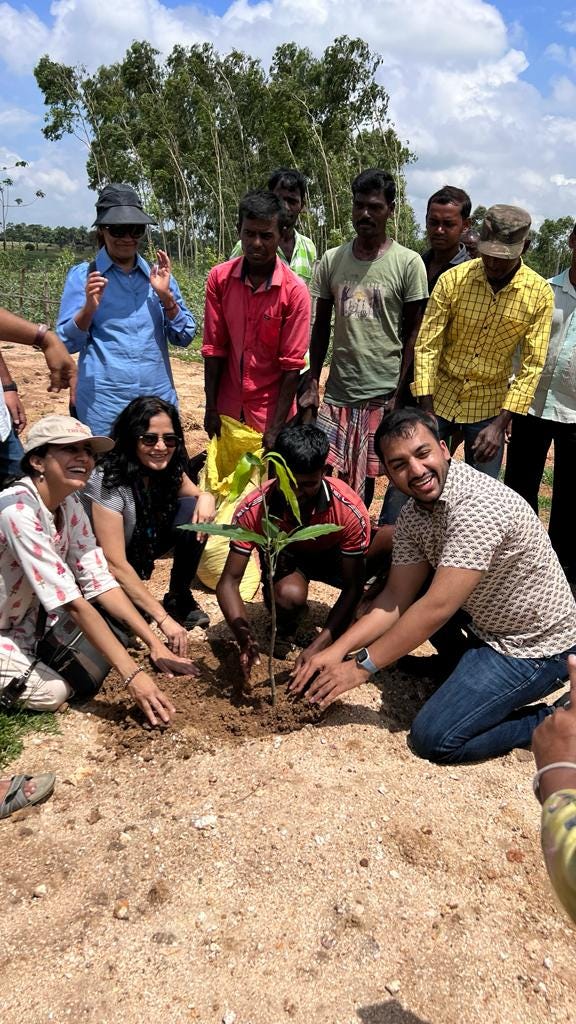How Engaged Philanthropy Creates Change Agents
(tales of journeys)
Stop Press!
In Calcutta, this Friday, 6th October, SVP (read on to figure out what this is!) is putting together a glorious evening of stories of journeys dreamt of and taken, called ‘Setu’. The redoubtable Ashish Dhawan (of ChrysCapital, Ashoka University, The Convergence Foundation) will talk about all things philanthropy. And four wonderful non-profits will talk about their work.
Can’t wait for it to happen!
Years back when I was a student in St Xavier’s Calcutta, the school authorities wanted to bring about a spirit of social engagements amongst the students. They requested each one of us to contribute something (anything!) into a kitty which would then be used to support an old people’s home. The catch was that the money had to be given specifically from our pocket money, so we could learn about 'sacrifice'! As an incentive, the more we gave the more points were earned by the House we belonged to.
Well, in spite of the nobility of the cause and the incentive of more points, the collections were less than satisfactory. Until someone got a brainwave. The school decided to start taking students to the Old People’s Home which their pocket money was supporting.
And that changed everything.
When we went to the Home, we were moved beyond words. We found lonely people without anybody coming to spend time with them and quietly desperate for attention and love. We played games with them, sat and chatted about their lives, read old fading letters they'd received years ago from a son or a daughter who had now migrated to Australia or had just disappeared.
Our monthly visits slowly became highlights for us, as we made bonds with the inmates, and we could see the joy which our mere presence brought to them. For an hour or two we were together transported into a warm cozy place of togetherness.
And the collection from pocket money soared.
We didn’t know about this at that time but the school had shown us two aspects of support viz. charity and engaged philanthropy.
When we cut cheques for causes, we do so out of the desire to support something which are asked to, perchance believe in and which we think is worthy of our support. Emotional disconnect is not necessarily an overriding reason. But if we increase our engagement to include personal participation of some kind, we start seeing the difference we are making and gradually we build an emotional connection, which ensures that we give far beyond what we would normally do.
There is no denying that money given for causes is a powerful tool to get non-profits to achieve what they set out to do, often with incredible results of impact and change. Some of the biggest donors like MacKenzie Scott have given massive amounts to non-profits across the globe – and have probably wrought change in the social sector like no other.
But on the other side of the spectrum, but equally importantly, the journey of philanthropy has to necessarily build upon fulfilment from both sides– of the donor and the donee.
The gospel behind Engaged Philanthropy is simple. It rests on the bedrock of the belief that collaboration is pivotal in order to produce an effective design evaluation process, give high quality service and support non-profits, partners, grantees ( as you wish to describe them), and foster collegiality that's necessary for the donors to be successful. By working closely with the donees, the donor gets to know them and is in a better position to assess the success of the programs – eventually establishing a humanitarian relationship based on trust.
A fabulous example of this in action is the Social Ventures Partners (SVP) model.
SVP was started by a bunch of Microsoft employees in Seattle in 1997, when they realized that the social sector needed partnerships and guidance as much as funds to make a difference. From a small beginning, SVP has grown into 400 partners across 7 countries, and has become a model of how engaged philanthropy brings gains to non-profits and fulfillment to the partner-philanthropist. In India, it has been in place for 10 years, spread over 8 cities with upwards of 400 partners, all practicing engaged philanthropy!
SVP strongly believes that collaboration and learning facilitate change. The more we hear from our donees and foster an environment of joint learning, information sharing and coming to the table from a place of curiosity, the stronger our community becomes. This allows us to create an even greater impact with our philanthropic endeavors. Through this close engagement we are also able to identify unique funding and partnership opportunities that may not have come to light without putting our relationships with donees at the centre of our collaboration model.
Last month, a bunch of SVP partners in Kolkata travelled deep into Birbhum district in North Bengal in support of a non-profit called Gram Samriddhi, which has started a movement in rural India to get farmers to shift part of their plantations to the growth of fruits to multiply their income and get out of their despairing cycle of debt.
Additionally, there were conversations on how to adopt gobar gas plants and use simple organic techniques to get quality yield and more dividends for the same effort. We planted seeds alongside the farmers, talked about how to make all-season wells by rain water harvesting and discussed how to make boundaries so goats wouldn’t come and eat young plants and saplings.
I asked a farmer who had volunteered for these initiatives about what made him take this bold step, which others were hesitant to take. He said one simple thing - “If you people hadn’t come to be by my side, and done this with me, I wouldn’t have had the courage.”
The presence and involvement of SVP partners was about to change the trajectory of a farmer’s life in irrevocable ways.
Engagement can take so many forms. SVP partners have helped nonprofits with HR processes, supply chains, fund raising, succession planning, et al. But there’s another step one can take. Engagement can also be done by being members in advisory committees and boards of nonprofits. This is a powerful way to guide the fortunes of nonprofits, as they get the strategic wisdom and corporate networks which help them widen the tapestry of their asks.
On the way back from Birbhum to Kolkata in the Vande Bharat train, we talked quietly, with a serene sense of having moved something forward. Amal Poddar, SVP's livewire partner who was leading this initiative, leaned over and said “This feeling would not have come if we had only cut a cheque for the seeds and the well and the gobar gas plant.” We knew this was true.
And this truth is possibly the biggest benefit of engaged philanthropy - we always - always - get back much more then we ever give.
Read this article also -
I Need to Tell You of The Things Which Happened to Me When I Said "Yes"
I have been a strange one. The first thing I think I learnt in life was the power of the word “yes”. It seemed to be imbued with magic, like Alibaba’s “Khulja Sim Sim” - it opened doors to strange, exciting - sometimes frightening - always exhilarating - adventures. When I look back, the thing I bless the universe most for is to make me foolish enough to…







Sunil thanks for posting. Very well expressed how SVP partners are impacting lives.